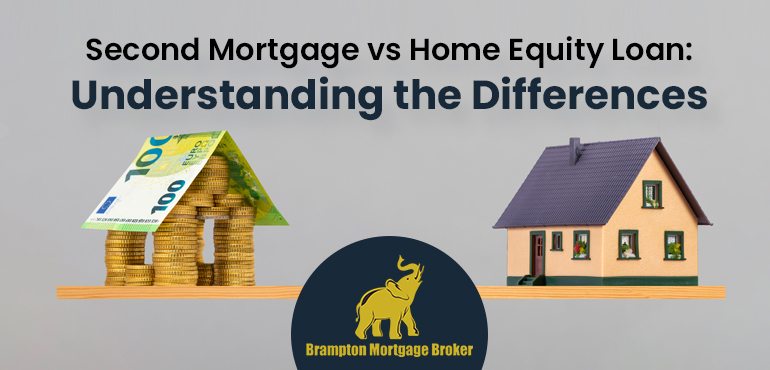Many homeowners seek financial solutions to leverage the equity they’ve built in their homes. Two standard options for tapping into this equity are second mortgages and home equity loans. While both can provide access to funds, they operate differently and have distinct features that suit various financial needs. This article guide put together by our team at Brampton Mortgage Broker will explore the disparities between second mortgages and home equity loans, shedding light on their mechanics, benefits, and considerations.

Introduction to Second Mortgages and Home Equity Loans
Before diving into the disparities between these two financial instruments, let’s clarify what they entail.
Second Mortgages:
As the name suggests, a second mortgage is a secondary loan secured against the same property as a primary mortgage. It allows homeowners to borrow against the equity they’ve built in their home. These mortgages typically come in two forms: home equity loans and home equity lines of credit (HELOCs). With a home equity loan, borrowers receive a lump sum of money upfront, while HELOCs provide a revolving line of credit similar to a credit card.
Home Equity Loans:
Home equity loans, sometimes called Equity Loans, are a type of second mortgage where the borrower receives a fixed amount of money upfront and repays it over a set term with fixed monthly payments. Interest rates on home equity loans are typically fixed, providing borrowers with predictable repayment schedules.
Key Differences Between Second Mortgages and Home Equity Loans
- Loan Structure:
- Second Mortgages: Second mortgages can take the form of both home equity loans and HELOCs. With HELOCs, borrowers have access to a revolving line of credit, allowing them to withdraw funds as needed up to a predetermined limit during the draw period. On the other hand, home equity loans provide a lump sum upfront.
- Home Equity Loans: Home equity loans offer borrowers a lump sum at the outset of the loan, which they repay over a fixed term with regular monthly payments. Unlike HELOCs, home equity loans do not typically have a draw period or a variable interest rate.
- Interest Rates:
- Second Mortgages: Second mortgage Interest rates, including home equity loans and HELOCs, can be fixed or variable. Variable rates may initially be lower but fluctuate over time, potentially increasing the borrower’s monthly payments.
- Home Equity Loans: Home equity loans usually come with fixed interest rates, providing borrowers with stability and predictability in their monthly payments. This makes them particularly attractive for individuals who prefer consistent payments over time.
- Repayment Terms:
- Second Mortgages: The repayment terms for second mortgages can vary depending on the type of loan. HELOCs often have a draw period during which borrowers can access funds and a subsequent repayment period during which they must repay the outstanding balance. Home equity loans have fixed repayment terms, typically five to thirty years.
- Home equity loans come with fixed repayment terms, meaning borrowers know exactly how much they need to repay each month and for how long. This can make budgeting easier and more predictable for homeowners.
- Risk and Benefits:
- Second Mortgages: Second mortgages can give homeowners access to a significant amount of cash, making them helpful in funding large expenses such as home renovations, medical bills, or debt consolidation. However, because the home secures them, there is a risk of foreclosure if the borrower fails to make payments.
- Home equity loans offer borrowers a lump sum of cash upfront, which can be advantageous for those who need funds for a specific purpose. The fixed interest rates and predictable repayment terms can make them a safer option for borrowers who prefer stability.
Considerations When Choosing Between a Second Mortgage and a Home Equity Loan
- Financial Goals: Consider your financial objectives and how you plan to use the funds. A home equity loan may be the better option if you need a large sum of money upfront for a specific purpose, such as home renovations or debt consolidation. A HELOC might be more suitable if you anticipate needing access to funds over time.
- Risk Tolerance: Evaluate your risk tolerance and comfort level with variable interest rates. If you prefer predictability and stability in your monthly payments, a home equity loan with a fixed interest rate may be preferable. However, a HELOC might be a better fit if you’re comfortable with the possibility of interest rate fluctuations and want flexibility in accessing funds.
- Financial Situation: Consider your current financial situation, including income, expenses, and debt obligations. Ensure you can afford the monthly payments on a second mortgage or home equity loan without overextending yourself financially. Additionally, be mindful of potential fees associated with these loans, such as closing costs and origination fees.
- Long-Term Plans: Think about your long-term plans for homeownership and how a second mortgage or home equity loan fits into your overall financial strategy. Consider how tapping into your home’s equity will impact your equity position and your ability to build wealth over time.
Conclusion
In summary, second mortgages and home equity loans offer homeowners a means of accessing the equity they’ve built in their homes to fund various expenses. While both options can provide valuable financial resources, they operate differently and come with their considerations. Understanding the disparities between second mortgages and home equity loans is crucial for making informed decisions about which option best suits your needs and financial goals. Whether you opt for a home equity loan or a second mortgage, carefully weigh the benefits, risks, and long-term implications before proceeding.
As a reputable mortgage broker, Brampton Mortgage Broker—Rumy Gill and his team can provide personalized guidance and assistance in navigating the complexities of second mortgages and home equity loans. With expertise in the mortgage industry, we can help you explore your options, secure competitive loan terms, and confidently achieve your financial objectives. Contact us today to learn more about how we can assist you in accessing the equity in your home and achieving your homeownership goals.
Contact us today by clicking HERE to schedule a 30-minute meeting or visiting https://calendly.com/bramptonmortgagebroker/30min. Our team is here to help with your Second Mortgage.
